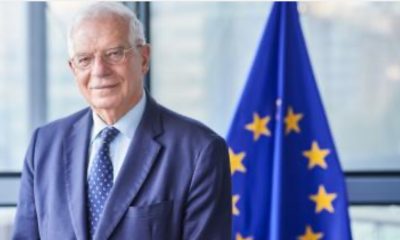Verdediging
Rachida Dati oor die radikalisering van EU-burgers: ''n Regte Europese reaksie is nodig'

 An estimated 5,000 European citizens have joined terrorist organizations fighting in Iraq and Syria. With the issue of foreign fighters posing challenges for governments across the EU, a report on preventing the radicalization and recruitment of European citizens by terrorist organizations will be put to a vote in the civil liberties committee today (19 October). Ahead of the vote, the European Parliament asked Rachida Dati (Foto), the French EPP member who drafted the report, why it is important to address this phenomenon at EU level.
An estimated 5,000 European citizens have joined terrorist organizations fighting in Iraq and Syria. With the issue of foreign fighters posing challenges for governments across the EU, a report on preventing the radicalization and recruitment of European citizens by terrorist organizations will be put to a vote in the civil liberties committee today (19 October). Ahead of the vote, the European Parliament asked Rachida Dati (Foto), the French EPP member who drafted the report, why it is important to address this phenomenon at EU level.
The fight against terrorism remains a core competence of the member states, why is a European approach needed today?
Over the past two years, terrorist attacks carried out by radicalized European citizens have taken place in a number of countries. There are hotbeds of radicalized Europeans across the Union, and due to the Schengen area EU citizens may travel freely.
We are thus facing a threat which impacts on all of us, and this is why a truly European response is needed. This need not mean fewer competences for member states but simply more coordination and collaboration.
Your report addresses the prevention of radicalisation, what are the measures you propose?
For a very long time our policies have not been proactive. We also need to be forward-thinking, by pushing our own counter-arguments against those of online terrorists, prosecuting the internet giants to push them to delete illegal content, segregating radicalized inmates in prisons, engaging in dialogue with the various religious communities, preventing radicalization through education and tackling terrorism-funding channels by guaranteeing greater transparency on external financial flows.
According to your report the internet is one of the primary channels of radicalization. We know that a lot of personal data is already gathered online, should we go further with this?
It is less an issue of adopting new surveillance measures than of properly implementing those already in place and, above all, exchanging the information we have with our European partners.
The biggest problem with the internet is the publishing and proliferation of illegal content. The internet giants must accept their responsibility. Should they refuse to cooperate or show themselves willing, I propose that they face criminal charges.
Deel hierdie artikel:
-

 Konferensies3 dae gelede
Konferensies3 dae geledeNatCon se aan-af-konferensie is deur die Brusselse polisie gestaak
-

 massa toesig4 dae gelede
massa toesig4 dae geledeLek: EU-ministers van binnelandse sake wil hulself vrystel van kletsbeheer grootmaat skandering van private boodskappe
-

 Konferensies4 dae gelede
Konferensies4 dae geledeNatCon-konferensie gaan voort by die nuwe Brusselse lokaal
-

 Europese Buitelandse Aksiediens (EAAS)4 dae gelede
Europese Buitelandse Aksiediens (EAAS)4 dae geledeBorrell skryf sy posbeskrywing



























